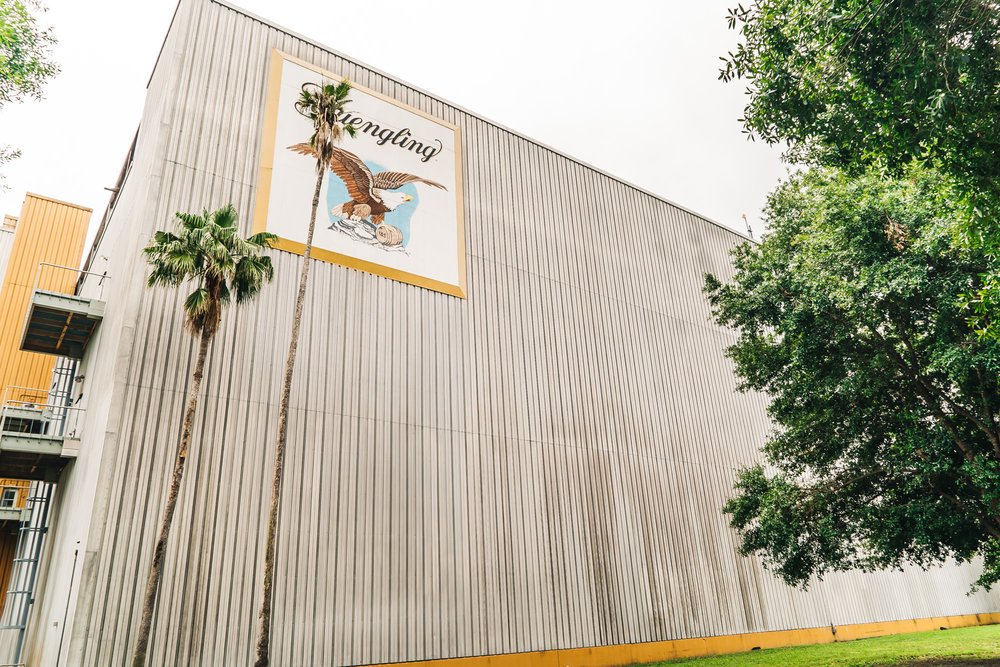60 Yuengling
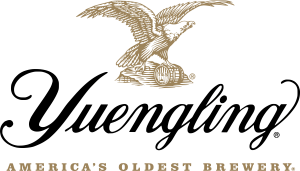
Introduction:
Yuengling beer America’s oldest brewery. Yuengling beer was founded back in 1829 by David G. Yuengling on Centre Street in Pottsville, Pennsylvania. Over 5 generations later it is still being operated by the Yuengling family. To understand the historic timeline, we have to break up the generations that operated the family business. The Yuengling’s created their original secret recipe called Lord Chesterfield Ale, and this ale can still be purchased today. The Yuengling beer is an American classic but can only be found in the United States, as the Yuengling family never chose to move their beer to other countries preferring to stay a smaller family run company unlike there bigger competitors.
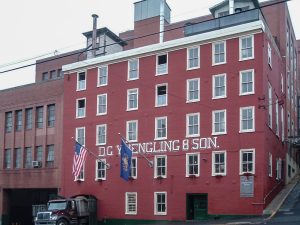
Origins:
In Germany, David G. Yuengling came from a family of brewers and was the youngest son of the family. David knew he wouldn’t be able to take the family business over so decided to move to the United States in 1828 to start his own brewing company (Eagle Brewery). David G. Yuengling started his company on Centre Street in Pottsville, Pennsylvania 1829. David chose to start his business in Pottsville because of two main reasons, the economy growth in that area due to the rising coal industry and the natural spring water in the area. In Germany a large % of beers were made from natural spring waters which best suited the type of beer David wanted to produce. David had this factory up and running from this location until a fire burnt this building down in 1831. He moved his location to Mahantongo St., this location was more suited for David’s business because of the very hilly area. Since at this time there was no refrigeration, David knew of a way to use the hills to process his beer and keep it cold. David had the coal miners tunnel areas below his brewery and from there set up pipes to have the beer flow through which helped with the long slow aging process of the ale. The ale was filled by hand into barrels and then stored in the tunnels until needed.
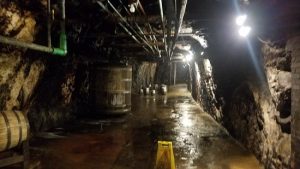
Key Milestones For First Two Generations 1828-1899:
David. G Yuengling came to the United States as a German immigrant in 1828 with the dreams of starting his own brewery. In 1829 Eagle Brewery was created. In 1831 Eagle Brewery burnt down and in the same year a new brewery was built at a new location. From 1831-1841 underground tunnels were built for the production and storage of the beer under the brewery. David. G Yuengling had three sons David Jr, Fredrick, and William. David Jr left his father to start his own brewery in Richmond Virginia. William passed away at age 36 which left Fredrick who joined his father in 1873. The company name was changed that year to D.G Yuengling and son. In 1877 David. G Yuengling passed away at age 70 and Fredrick took over the business. Fredrick added the bottle line to the brewery in 1895. In 1899 at age 51 Fredrick passed away leaving the company to his only son Frank Yuengling age 21.
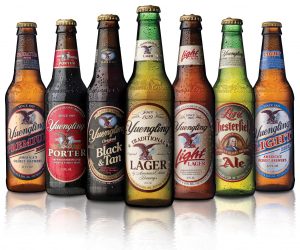
Brewing Science and Industrialization 1900-1999:
Yuengling brewed and ran their business the old-fashioned way and they where very slow in joining other brewing companies with industrialization. Owner Frank Yuengling passed away in 1963 at age 86 after being owner of the company for 64 years. The fourth generation of Yuengling took over, franks two sons Richard and Dorham Yuengling. Dorham would pass away eight years later in 1971 leaving full ownership to Richard Yuengling. Over the years of Richard owning the business, Yuengling struggled financially to the point that Richard would sometimes use his personal money for the payroll so that his employees would always be paid. Industrialization was taking over and Yuengling couldn’t keep up with other companies that where constantly upgrading with things like interstate transportation, refrigeration, national advertising… It got to the point that Richard was thinking about the option of selling the business but decided against it but knew they needed to do something or they would have to close the family business. Richard’s son Richard Jr. had big plans and dreams for the company followed with ideas on how they could turn the company around. Richard and his son Jr. would fight over the ideas as all the ideas he had would cost the company money that they didn’t have, but Richard finally listened to his son and built a warehouse to help with storage, getting the trucks in to load and unload easier and overall produced a more productive way of handling their product and his ideas paid off. In 1985 Richard Jr. bought the company from his father. Richard is now the fifth generation to own the Yuengling company and is still the owner to this date. Richard Jr. sets out big plans to bring Yuengling into the new era as a larger and more profitable business that can compete with the larger companies. Richard knew that to take Yuengling to the next level he would have grow his sales department to spread sales wider around the country. They changed the packaging and logos. They brought back the traditional amber lager and used a green bottle for a new more imported look. Yuengling sales skyrocketed to the point that they where in too much demand for them to handle, so he decided to build a second brewery called “Mill Creek”. Richard Jr. took Yuengling from almost bankrupt to being able to build a second brewery and then also buy a third brewery in Tampa Florida to help with the rising demand for their product.
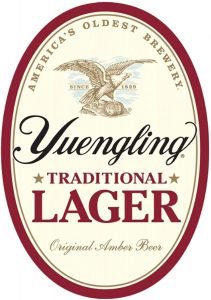
Beer Style:
The Yuengling beer is based as a German style beer that requires the beer to have fresh spring water and cold temperatures so that the beer can ferment properly. Yuengling beer started as a light clear lager, and they have produced many different beers from their original recipe. Some of those beers you can get today are the traditional lager which has a rich amber color with roasted caramel malt for a sweetness. They offer a Light Lager 99 for those that want a low-calorie drink and many more. But the Yuengling family recipe is a secret recipe that they have not shared to the world.

WW1, Prohibition and WW2 Era:
Through WW1 (1914-1918) Yuengling was not impacted much by the war. Yuengling only had one brewery and was not selling their product throughout the country or outside the United Stats like some of their bigger competitors so when the war was taking place their sales went down and they could not produce as much as they wanted too. The short term affects of WW1 was a slight decline in sales and no long term affects. Unlike WW1 when prohibition started in the United Stats (1920-1933) Yuengling saw themselves in troubles with keeping their small family business alive. With Yuengling being a small family business, they did not have the financial savings to wait for prohibition to end, they needed to find other ways of making their business money without breaking the law and producing their beer. Frank Yuengling decided to start making “near beer“ which was 0.5% alcohol and was legal to make and sell. They also got into the dairy business selling ice cream. This kept the Yuengling company alive, and their employees employed through the prohibition. At the end of the prohibition Yuengling celebrated by producing a beer they called “Winning Beer” and had a truckload sent to President Franklin D. Roosevelt. Short term for the prohibition they struggled to find ways to keep their company alive but the long term it gave Yuengling new business opportunities which worked out in their favor over time. WW2 was like WW1 for Yuengling they where still a small company and still did not expand their area of which they sold their product, so WW2 did not impact the Yuengling company much other then a decline in sales and how much they could produce. Short term affect from WW2 for Yuengling was a decline in sales and no long term affects for Yuengling from WW2.

Consolidation:
For the Yuengling brewery it was impacted at times trying to keep up with the changes of the generations, but they were always in the mind set to be able to come up with ideas with what was around them to make things work. For example, right from the start choosing the location of the plant, the spring waters and using the caves to ferment and keep their beer cold during a time of no refrigeration or electricity. Another fact that kept them operating was keeping the business small, they were able to ride those tough times. Each generation found solutions to whatever they were facing at their time. I think the prohibition was one of their lowest points but again they were able to come up with ideals to keep their business open. Making Neer Beer and ice cream they were able to keep their doors open. They did have to let some staff go but not close like so many other breweries, nor were they in the position to have to merge with a larger brewery to exist. They did suffer another low point and was close to closing their door, but Richard (Dick) Yuengling Jr. took over the company and had many ideals and pushed forward. He knew to broaden their playing area and needed help from outsiders and that is when he hired a sales team and changed the bottling and labeling. He even opened a brewery in Florida. Yuengling brewery has been run and owned by one family, and even today the staff working for them feel like family also.
Marketing and Branding:
The first 4 generations of Yuengling all had the same ideas when it came to marketing and branding, keeping it a small family ran business and never looked at growing the business with all the potential it had. When Richard Yuengling took over as the 5th generation to own the family business, he came in with a bunch of new ideas and ambitions to grow the company. Richard built a sales team which where specialist in the fields of sale, marketing and or branding. Yuengling did a 180 turn and changed a lot with the company, they changed the logo, the bottles and how they would distribute and lots more. With the sales team they also reached out to a lager number of potential customers. Richard also decided to add new and improved equipment which made the brewery more efficient. Everything they did to change the company worked for them. They had so much success with their new branding ideas that they needed to open up more Yuengling breweries to keep up with their demand. Richard had the idea to buy a brewery in Florida which moved their product south and opened up a whole new area of potential clients. Even after all these changes Richard still managed to keep the Yuengling company a family like atmosphere with all the changes they made to improve and grow the company. That was one of the biggest things he never wanted to change.
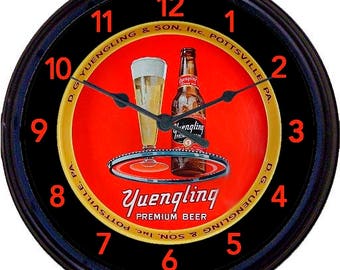
Modern Era:
In today’s modern era Yuengling under owner Richard Yuengling has turned the company around and have taken them from almost closing their doors to expanding the company to the point where Yuengling is a household name in the beer industry across the United States. The company went from having only one brewery to buying another one in Florida and building a brand new one in their hometown of Pottsville, Pennsylvania. Richard knew if Yuengling was to keep up in the modern era he would have to change how everything was ran with the company and he did just that. Richard renovated the brewery with new up to date equipment and made a sales team to spread word of their great product. By making these changes the company thrived. Sales went up and the demand of the signature taste of Yuengling beer everyone kept asking for it. They say if you go to a bar anywhere in the N/E side of the United States and ask for a lager most likely you’ll get a Yuengling beer. The Yuengling company in the modern era is only growing by the day and sooner or later will be seeing it in other countries. This is all thanks to Richard Yuengling and the dreams and ideas he had for the company.
References:
Y & S. (n.d.). Oldest brewery in the US & world (Yuengling: Weihenstephaner). FindMeABrewery. Retrieved February 3, 2022, from https://www.findmeabrewery.com/oldest-brewery/
Y & S. (n.d.). Lord Chesterfield Ale – American pale ale (APA) – yuengling beer co.. Just Beer. Retrieved February 3, 2022, from https://justbeerapp.com/beer/lord-chesterfield-ale-1
Y & S. (2017, February 28). Home. Yuengling. Retrieved February 3, 2022, from https://www.yuengling.com/
Pictures:
Thomas, G. (2019, June 17). D. G. Yuengling and son brewery. SAH ARCHIPEDIA. Retrieved February 3, 2022, from https://sah-archipedia.org/buildings/PA-02-SC8
Wikipedia. (2022, January 23). Yuengling. Wikipedia. Retrieved February 3, 2022, from https://en.wikipedia.org/wiki/Yuengling
G, R. (2019, July). Tunnel – picture of D.G. Yuengling and Son Brewery, Pottsville. Tripadvisor. Retrieved February 3, 2022, from https://www.tripadvisor.com/LocationPhotoDirectLink-g53488-d595233-i406202133-D_G_Yuengling_and_Son_Brewery-Pottsville_Pennsylvania.html
Scene, N. E. P. A. (2017). D.G.-Yuengling-and-Son-beer-brewer-Pottsville. NEPA SENCE. Retrieved 222AD, from https://nepascene.com/2017/03/yuengling-no-1-craft-brewing-company-country-4th-overall-nationwide-sales/.
Scene, N. F. P. A. (2020). Maxresdefault. NFPA SCENE. Retrieved 2022, from https://nepascene.com/2020/09/yuengling-expand-west-first-time-2021-help-molson-coors/.
pockets , tianel. (2021). The Free Yuengling Beer Tour in Tampa, Florida. Tianel pockets . Retrieved 2022, from https://www.thetravelpockets.com/new-blog/yuengling-beer-tour-tampa-florida.
Mulligan, A. (2021). Here’s why you’re seeing Yuengling beer everywhere in Texas — and why people have opinions about it. Houston Chronicle. photograph. Retrieved 2022, from https://www.houstonchronicle.com/food-culture/article/Here-s-why-you-re-seeing-Yuengling-beer-16400851.php.
Canada , E. (2020). Yuengling beer. Etsy Canada . photograph. Retrieved 2022, from https://www.etsy.com/ca/market/yuengling_beer.

